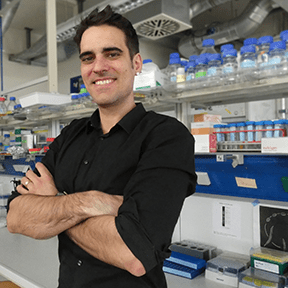Biology Graduate Programs
The School of Biological Sciences comprises research groups that span the broad spectrum of the life sciences. Reflecting this diversity, graduate training is provided through two focused graduate programs. Each program features its own research emphases, journal clubs, and requirements for advanced degrees. Multiple faculty members participate in more than one graduate program.
Many of our faculty members also participate in the interdepartmental programs in Molecular Biology, Biological Chemistry, and Neuroscience. These programs have their own admissions processes that are independent from the School of Biological Sciences. Please see the websites of these programs for details about their specific admissions requirements and application processes.
Message from the Graduate Program Director
 We are excited that you have chosen or are considering the School of Biological Sciences at the University of Utah to pursue your graduate studies in biology!
We are excited that you have chosen or are considering the School of Biological Sciences at the University of Utah to pursue your graduate studies in biology!
Our school provides an interactive and inclusive environment for you to pursue your passion for science. Our faculty comprises nearly 50 members whose research interests are diverse, and who serve as mentors for ~90 graduate students from around the world. Complementing outstanding faculty, staff and facilities, the school’s graduate program is highly interactive.
In performing your graduate studies in the program, you will be exposed to a wide range of biological investigation, from molecular structures and cells, to genetics, to organisms and ecosystems and their interactions. The school’s collegial environment, with many opportunities for interactions among research groups, has been a long-standing strength, and continues to be so today. Graduate school is a time to make lifelong friendships and connections as you grow as a scientist and mature as a person. It is a challenging and exciting time, one filled with opportunities to make new discoveries as you acquire important skills and disciplined logical thinking that will serve you for the rest of your career. Pursuing a post-baccalaureate degree can be a life changing and rewarding experience. Our lives were shaped and enriched by our times in graduate school, and we hope that your time in the School of Biological Sciences will be similarly influential in your life.
We wish you the best for your scientific explorations as you move through your graduate studies!
Colin Dale
Graduate Program Director
Frederick Adler
SBS Director
Graduate Student Coordinator
SBS Graduate Students are encouraged to meet early and often with the Graduate Program Coordinator.
Shannon Nielsen
shannon.nielsen@bioscience.utah.edu
(801) 581-5636
South Biology Building
257 South 1400 East, Rm. 223

Rotation Advisor for MCEB Students

Graduate Student Research Programs
Reflecting research diversity at the School, graduate training is provided through two focused graduate programs. Each features its own research emphases, journal clubs, and requirements for advanced degrees. Multiple faculty members participate in more than one graduate research program.
Latest News
Nerd with a passion for the outdoors
Growing up on a hobby farm in the Pacific Northwest, Shelley Reich developed a keen interest in biology, especially genetics and animal behavior. She fondly recalls the imprinted ducklings that followed her around the farm, litters of Australian shepherd puppies her family raised, and the acrobatics of newborn calves not even 24-hours old. In addition […]
Read MoreAnna Vickrey, PhD’20
Anna Vickrey Anna Vickrey who graduated from the School of Biological Sciences with a PhD in 2020 has always been fascinated with domestication, both the process and the “products” which include the plants and animals important to our lives and history as humans. “I became really interested in the morphological diversity present both in domestic […]
Read MoreElaine Tan
The difference between the flora and fauna of Malaysia and that of the Great Basin and Wasatch Mountains could not be more different. And yet it was the latter where SBS graduate student Elaine Tan (they/them), whose family is from the former, decided to do their graduate work in ecology and the evolution of social […]
Read MoreThe Concrete Jungle’s impact on mammal biodiversity
City dwellers seldom experience the near-reverence of watching deer walk through their yards, both for a lack of deer and, often, a lack of a yard. In cities, not everyone has the same experiences with nature. That means that the positive effects of those experiences—such as mental health benefits—and the negative effects—such as vehicle strikes—are […]
Read MoreINTERESTED IN STUDYING BIOLOGY?
Apply to a leading research institution, the School of Biological Sciences at the University of Utah.
GRADUATE STUDENTS APPLY NOW


